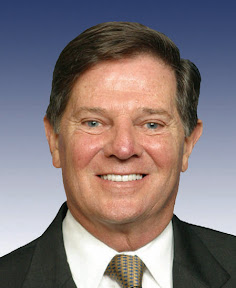
Tom DeLay has been sentenced to three years in prison, but he will appeal the conviction. Image from Wikimedia Commons.
Disgraced former Congressman Tom DeLay has been sentenced to three years in prison for money laundering. The former House majority leader was found guilty of illegally funneling money from corporate donors to state Republican candidates. Texas law forbids corporate donations to political campaigns.
Tom DeLay sentenced to three years
Tom DeLay, the former Republican Majority Leader in the United States House of Representatives, has been sentenced to three years in prison after being convicted of criminal conspiracy and money laundering charges, according to the New York Times. DeLay was convicted of illegally funneling money from corporate donors and conspiring with others to have done so. More than $190,000 of corporate donations were received by the Republican National Party, which DeLay and aides funneled to Republican candidates in Texas. The reason for the charges, and ultimately the Tom DeLay conviction, is that Texas law prohibits corporate donations directly to political candidates. The decision is likely to be appealed, and DeLay is probably going to be free on bond while appealing his conviction.
Could have received life
Tom DeLay could have been sentenced to life in prison, had the judge not accepted a plea deal. The judge agreed to 10 years of probation for DeLay on the conspiracy charges, which could have meant a far longer sentence. However, Judge Pat Priest was not buying DeLay"s explanation for the charges in the first place. Tom DeLay has argued all along that he was only being charged because Democrats, including the prosecuting attorney, were out to get him because he was an outspoken Republican and because of redistricting, according to CNN.
Appeal due soon
The defense is going to appeal the conviction. DeLay was remanded into custody after the sentence, though he will likely be free on $10,000 bond. Texas law forbids corporate donations directly to candidates, but the defense will likely challenge on the grounds of Citizens United v. the Federal Election Committee, a controversial Supreme Court decision that says corporations cannot have their right of free speech restricted, including campaign contributions.
Sources
Read More... [Source: Top Stories - Google Blog Search]

No comments:
Post a Comment